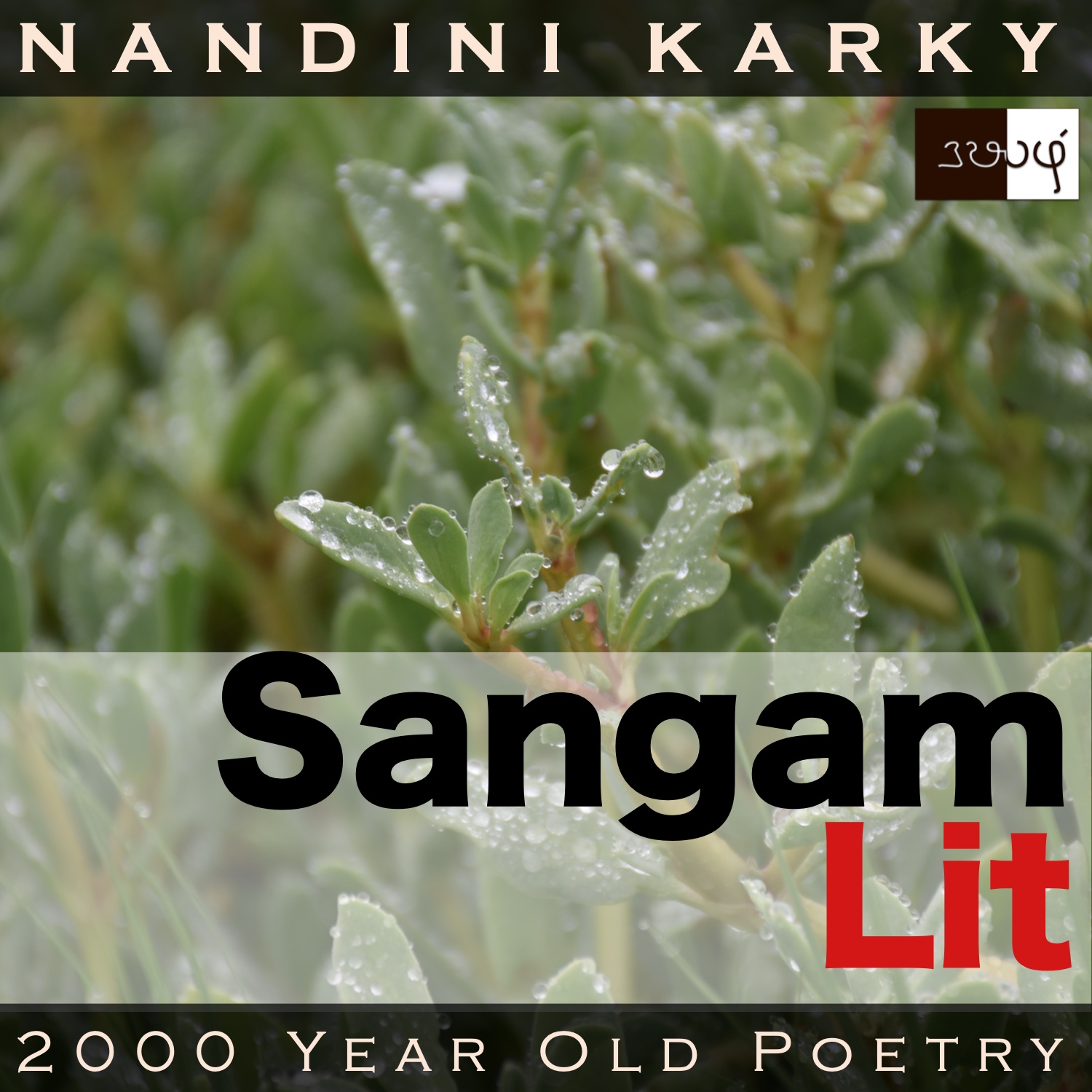Podcast: Play in new window | Download
Subscribe: Apple Podcasts | Spotify | Amazon Music | Android | iHeartRadio | TuneIn | RSS | More

In this episode, we perceive the effect of rains on land and life, as depicted in Sangam Literary work, Kurunthogai 391, penned by Ponmaniyaar. Set in the forests of ‘Mullai’, the verse speaks in the voice of the lady to the confidante, relating the tormenting elements in her surroundings, as the man remains parted away.
உவரி ஒருத்தல் உழாஅது மடியப்
புகரி புழுங்கிய புயல் நீங்கு புறவில்,
கடிது இடி உருமின் பாம்பு பை அவிய,
இடியொடு மயங்கி இனிது வீழ்ந்தன்றே;
வீழ்ந்த மா மழை தழீஇப் பிரிந்தோர்
கையற வந்த பையுள் மாலை,
பூஞ் சினை இருந்த போழ்கண் மஞ்ஞை
தாஅம்நீர் நனந்தலை புலம்பக்
கூஉம்-தோழி!-பெரும் பேதையவே!
‘The rains are here, and so, is my distress’ exclaims a voice in this verse. The opening words ‘உவரி ஒருத்தல் உழாஅது மடிய’ meaning ‘hating its lot, the male lies down without ploughing’ starts with ambiguity, because these words talk about the male of an animal but does not say which one. Since the word ‘உழாஅது’, which has farming connotations, has been used in connection with this animal, some scholars have interpreted it to mean a farm bull. However, this is not the ‘Marutham’ setting, and some other scholars, with whom I agree, have decided to see this as a boar, using that farming word ‘உழாஅது’ to mean its synonym of ‘digging up’. Returning, we find another animal in the rhythmic words ‘புகரி புழுங்கிய’ meaning ‘a deer swelters’, indicating the heat of the land just then. Ending all this dryness, ‘pours down heavy rains’ in ‘வீழ்ந்த மா மழை’. Time of the day is then revealed by ‘பையுள் மாலை’ meaning ‘suffering-filled evening’. Next, it’s a dashing bird making its appearance in ‘மஞ்ஞை’ meaning ‘peacock’. Ending with the words ‘பெரும் பேதையவே’ meaning ‘vastly foolish these are’, the verse intrigues our curiosity.
Boars, deers and birds make this verse throb with life! The context reveals that the man and lady were leading a married life when the man parted away to earn wealth. Before he leaves, he promises the lady that he would be back by a particular season. In the man’s absence, the lady languishes, making the confidante worry about how the lady would bear with his parting. To the worried confidante, the lady says, “Filled with dislike, the male boar lies idle without digging up. The spotted deer too is flustered by the intense heat in that rainless forest land. And then, with harsh and quick beats, thunder strikes and ruins the hoods of snakes. Fused with this thunder, rain falls pleasantly. Following these heavy rains, making those separated from their beloved ones suffer, arrives the angst-filled evening. At this time, with feathers appearing as if eyes are flowering from branches, the peafowl calls out aloud making those water-flowing, wide spaces resound with loneliness. My friend, those birds are foolish indeed!” With these words, the lady explains how it’s difficult to bear with the man’s parting as the promised season of return announces its arrival on their realm.
A season so pleasant to nature seems to sketch sorrow in the lady’s nature. She starts by talking about a time when a wild boar was filled with dislike for its situation, for without its usual digging up, it was lying down idly. The reason for this becomes a little clearer as we observe another animal, a deer in this case, in distress, because of the dry heat just then. As the soil beneath had dried up without a drop of moisture, the boar is unable to dig down and claim its meal of tubers, and that’s why it gives up and lies there in misery. Putting an end to all this, a loud sound is heard. That of thunder, and if thunder comes, can rain be far behind? As promised, the rains come down, lifting the spirits of all life that dwells in that forest. All life, except the snakes, that is, for Sangam people believed that rains destroyed snakes. Certain groups of humans too suffer because of these rains and they are none other than separated lovers.
Causing further distress to these poor souls, the evening arrives in addition to those pouring rains. As if the rains and evening time were not enough, another event unfolds. To describe that, the lady first talks about the perpetuator of this incident. It’s a peafowl and to describe this bird, the lady employs an exquisite simile. How would it be if a pair of eyes were split up and each one happened to bloom like a flower on a tree’s branch? That’s exactly how the feathers of this peacock looks, details the lady. Then, she explains how, on this rainy evening, this bird calls out aloud, making the lady conclude that it must really be thoughtless! Why thoughtless, because the peacock seems not to realise how troubled the lady already is, because the promised season of return had arrived, and in that season, the evening time, terrible to parted lovers, had unfolded, and yet, the peacock seems to screech about, without a thought for the lady’s aching heart! The verse is a perfect demonstration of what modern psychologists call as ‘mindfulness’. By being acutely aware of the changing world around her, noting the sounds and images, and also seeing how her own heart is reacting to these changes, although she realises not, the lady paves the path out of her sorrow. ‘Be present’ is the present this verse offers to a distressed heart, no matter the space or time!




Share your thoughts...